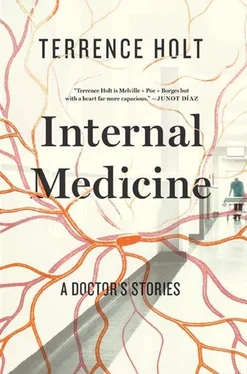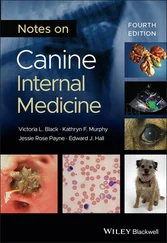AFTER AN INTERMINABLE PERIOD marked in my memory by scattered flashes — Joe’s face, a mixture of concern for me and for his pager, which kept going off; the amusement on the faces of the staff; beyond them the frieze of patients caught in attitudes of surprise, incomprehension, or intense concentration on any number of objects in the area, including me; and the interminable business of cleaning up the mess I had made — I followed Joe the long distance of the hallway toward the locked doors at its end.
Radiology was dark again, Reggie by now gone home for the night; the room flickered into light as Joe palmed the switches. He stooped to the bins below the counter, and I heard the stiff film jackets falling back into their bins with a hollow knock as Joe lifted each in turn.
“Roberson, Rush, Rutledge,” he muttered. “Sandler, Saknussem, Scarne. Scatliff.” He stood, grunting, snapped a pair of view boxes on, and slipped the films under their clips.
A crown of ribs, translucent with age, floated above dim clouds of bowel; a few dark pools of gas, a scatter of phleboliths, the spine a gnarled tree, but no foreign body. Nothing disrupted the ordinary shadows of an old man’s belly. I let out a sigh. Joe stepped back from the view box and ran a hand through his hair.
“I don’t see anything,” I said.
He nodded.
“That’s good,” I said.
He gave me a sidelong glance. There was something in his expression I couldn’t read.
“How are you feeling?” he asked quietly.
“Oh, me?” I felt embarrassed again. “I’m fine.”
“Good,” he said, and then: “Would you mind?” He stooped below the counter, and from the leftmost bin brought out another film jacket. Slipping two sheets into the box beside the one that held Scatliff’s KUB, he thumbed the switch and the images flickered into light and shadow.
It was Carrie B again. I stepped back, struggling with annoyance. Why was he dredging this up? Below the annoyance I could feel a wave of anxiety surging back and forth.
“I think I get it,” he said, as much to the films as to me.
I was beginning to feel the fatigue of the night. I could not see any connection between these two sets of films, and feared another discourse on God’s mystery. I had enough craziness on my hands already.
“I think I know what she was trying to say,” Joe said.
“What?” I said. It was an expression of irritation more than a question.
He gestured at Carrie B’s films, its darkness hedged about by bright spines. “There’s nothing there, either,” he said.
I had an impulse to say something snide, but it died before I could find words for it. For a moment I wondered if I was going to vomit again.
“It’s a. a crying out. An appeal.” He was speaking more to the films than to me by now, his revelation leading him in pursuit. “She put those needles in looking for some response — not from us, from herself. Because she’s empty inside, too. See?” He waved again at the films, but now he had turned his face toward me, his eyes alight in the glow of the view box, his hair a wild crest. He really did look mad.
“At least when she sticks needles into that”—he waved again without turning—“it responds. She feels something .”
I think the expression on my face must have told him I wasn’t following.
“The body,” he explained. “It’s important. You must know that.”
I wasn’t sure if he was addressing me as an internist, or as someone who had recently splashed the contents of his guts on the floor of the Gero unit.
“We think it’s about the mind, you know. All of this”—he waved his hand in the air—“we think it’s about personalities and psychology. But all that’s secondary. It all. depends. On this.” And here he turned again to the films on the wall: dark and unrevealing Mr. Scatliff, bright and mystifying Carrie B.
“It’s the body that’s the problem. But what makes us call them crazy is that they try to solve the problem: They feed it garbage. They feed it pain. The rest of us just suffer it, like the beasts of the field.”
All I could think to say was, “Isn’t that where we come in?” but it sounded lame as I said it.
Joe laughed. “I think we’re part of the problem.”
I could only stare.
“We’re not solving anything. Not the way they do. Those things they do, they mean something. What does all our medicine mean ?”
I realized I had no idea what he was talking about. I was tired, and didn’t care. The air in the room had something in it I didn’t want to acknowledge.
Joe dispelled it with a sudden laugh, a shrug. He turned back to the view box and pulled the films, jacketed them. “I do go on sometimes,” he said. And then, turning, “Are you okay?”
I pretended he was speaking about my stomach, which felt empty, and told him I was.
THE TRAFFIC ON I-40 was heavy despite the lateness of the hour. I drove in the right-hand lane, too tired to join the rapid weaving of the faster lanes, pinned behind a panel van driving stolidly at sixty. I felt the trip stretching out, its duration rendered uncomfortable by my thoughts. The image of Carrie B’s X-rays floated ghostly over the road ahead, the bright streaks in it seeming to crack open the darkness: something struggling to break through the shadows. I was tired of thinking about her, but the image persisted, distracting me from the road ahead. I shook myself upright, gripped the wheel tighter, tried to dispel the illusion of something hovering over the pavement, but as I did the discomfort I had been feeling, which I had thought at first was simply fatigue, and impatience over the slow pace of the van ahead, solidified, forming a solid knot in my gut.
I remembered, with a fleeting, visceral burst of shame, how I had vomited on the Gero unit. I had never done this before, I thought, not on any of the rotations of my residency or medical school, where I had witnessed things far worse than Mr. Scatliff retching up the contents of a garbage can.
What had gotten into me? The knot in my stomach would not relax: it tightened, rather, and began to burn. I began to feel as if I couldn’t catch my breath. In a moment, I told myself, I would begin to feel sharp spines between my ribs.
What was the matter with me? The image of those films, the impossible sharpness intruding where there should have been only curves and soft shadows, flashed before me again. I tried to shake it away, but it persisted, and with it the pain in my belly seemed to sharpen.
I was starting to feel something more, as well, I realized: something like fear. Was I having a panic attack? Without realizing it, I had started to slow down: the rear of the panel van was receding ahead of me; lights were glaring in the rearview mirror. I bore down on the accelerator and reluctantly, as if it, too, were laboring under some inward malaise, the car responded, the speed creeping up again to sixty, sixty-two, and the panel van drew nearer, its dull white silhouette almost blocking out the ghost of Carrie B.
But even as I tried to take command of myself, the sense of impending doom rising in my gut grew stronger, beginning to take on the unmistakable edge of fear. My pulse was accelerating. I was starting to sweat.
What was the problem? I had seen an old man vomit garbage. I had seen a woman with needles in her chest. And this had me on the verge of panic? I wasn’t supposed to be scared by this kind of thing: the vicissitudes of the body hadn’t frightened me since the first week of medical school.
It had never occurred to me before that nerve was so essential to being a doctor. What if I had lost it?
This question only added, of course, to the unidentifiable sensation still surging up in me, which I was beginning to think was the opening salvo of a psychotic break. Had I picked up something in the hospital? Some psychiatric contagion?
Читать дальше












